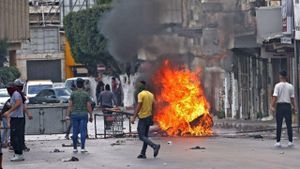The South Korean government has established a Special Investigation Team to probe suspected illegal activities at Daewoo Shipbuilding & Marine Engineering (DSME), amid serious allegations of corruption and mismanagement. This initiative highlights the government's commitment to ensuring transparency and accountability within one of its significant industrial pillars.
According to reports released on November 20, 2023, the decision to form the Special Investigation Team is deemed necessary due to increasing concerns about Daewoo Shipbuilding's practices, which have come under scrutiny following allegations of malfeasance. The Minister of Trade, Industry, and Energy, Kim Kyung-soo, remarked, "The decision to form the Special Investigation Team is part of our commitment to transparency and accountability." This statement reinforces the government's stance on addressing the issues at DSME decisively.
The gravity of the allegations against DSME has prompted this extraordinary measure. The shipbuilding sector is instrumental to South Korea's economy; hence, any suspicion of wrongdoing could ripple across various industries and erode public trust. Public interest remains high as this investigation could determine the fate of numerous contracts and affect thousands of jobs within the sector.
Lee Jae-myung, head of the Investigation Unit, affirmed the government's dedication to tackling the allegations head-on. "We will employ all necessary methods to investigate these serious allegations, including cooperation with international agencies," he stated, underscoring the seriousness of the investigation and the eagerness to leave no stone unturned.
The Special Investigation Team will comprise experts and officials from various investigative agencies, aimed at conducting thorough assessments of the alleged illegal activities. Operative methods will likely include comprehensive audits, interviews, and extensive document reviews, utilizing the expertise of both domestic and foreign entities to probe the complex web potentially surrounding DSME.
The team’s formation has been met with mixed reactions from the public and industry insiders. Some view it as a necessary step toward greater corporate accountability, arguing it is imperative for the health of the South Korean economy, particularly as the global shipbuilding market recovers from previous downturns. On the other hand, skeptics question whether the investigations will lead to meaningful changes or simply serve as political theater.
With this significant development, the future of DSME hangs precariously. Should the allegations be substantiated, it could lead to severe consequences for the company, ranging from financial penalties to restructuring operations entirely. Given DSME's substantial role within the domestic and international shipbuilding markets, such outcomes could deeply impact the sector's stability.
Members of the government have also emphasized the need for quick and efficient results from the investigation. The Minister remarked on the importance of not only addressing these issues but also restoring faith among employees and stakeholders within the industry. Public scrutiny is advised as the outcome of this investigation could very well determine competitive structures and innovation potentials within the shipbuilding arena.
The investigation’s timeline has yet to be publicly disclosed, generating curiosity among industry observers and the public alike. Still, government officials assure all requisite measures will be taken to expedite the process as quickly as possible. Transparency throughout the investigation is anticipated, with periodic updates expected to keep the public informed of significant developments.
Critically, the formation of the Special Investigation Team is not just about the allegations against DSME, but it's also indicative of the broader efforts by the South Korean government to cultivate trust among its citizenry concerning corporate governance. It reflects the changing tides within South Korea's regulatory environment, with greater regulatory scrutiny becoming the norm.
The outcomes of these investigations could also set precedents for future governance practices across various sectors, potentially leading to reforms aimed at enhancing corporate responsibility and ethics.
Considering the significance of the shipbuilding sector to the nation's economy, the ramifications of this investigation could be extensive. Industry stakeholders will be watching closely as the Special Investigation Team begins its work, anticipating significant impacts on operations, policies, and possibly the long-term viability of DSME.
At the heart of these developments is the broader narrative of accountability and ethical business practices, which is increasingly becoming integral to the corporate fabric of South Korea. The government’s proactive approach signals its intention to safeguard the integrity of its industrial frameworks and to assert its role as both regulator and protector of public interest.
Moving forward, the Government and Special Investigation Team's actions over the coming months will undoubtedly influence public opinion and shape future interactions between industries and regulatory authorities. To be effective, the investigations must yield not only accountability but also constructive pathways to repair and reform within South Korea's significant industries.



